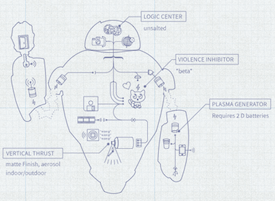 Last week Wired published an article by Cade Metz describing Hubot, an intelligent assistant (of sorts) built in-house by Github. Githubbers use Hubot to do everything from pushing critical code updates to the right server to cluing them in on what food trucks are waiting outside. And since Github is all about open source software, they’ve posted all the code to Hubot and made it available to anyone that wants to use or modify it.
Last week Wired published an article by Cade Metz describing Hubot, an intelligent assistant (of sorts) built in-house by Github. Githubbers use Hubot to do everything from pushing critical code updates to the right server to cluing them in on what food trucks are waiting outside. And since Github is all about open source software, they’ve posted all the code to Hubot and made it available to anyone that wants to use or modify it.
Hubot integrates with most chat systems, including Slack, Google Messenger, and other Internet Relay Chat (IRC) systems. Chat platforms seem to be taking the enterprise by storm these days. Is Hubot the advent of a new form of enterprise intelligent assistant?
Metz mentions in his article that Github coined the term “ChatOps” to describe the style of chat-based task management that has grown organically out of the DevOps movement. DevOps is all about automating previously manual tasks associated with developing, managing and migrating software code. Recently, chatbots like Lita have been introduced to provide DevOps teams with a conversational platform that keeps team members in touch with each other while also automating core tasks. Slack’s Slackbot assistant is also growing in popularity.
Using Javascript to Automate Critical Enterprise Tasks
Hubot is one of these chat-based assistants, but Hubot is capable of just about anything. To create a new skill for Hubot, all you need to do is write a script using Javascript, a pretty accessible programming language. Hubot is so handy that its use is rapidly expanding beyond Github to other enterprises. Metz names Box, the enterprise cloud storage company, as one example of a company that has deployed Hubot to automate critical tasks.
Hubot has limitations. Communication with Hubot happens in a way reminiscent of command-line interactions. To engage with Hubot, you start your command or question in the chat interface with a slash (“/”), followed by the exact command. If you don’t know or have forgotten the command for requesting info on which food trucks are outside, for example, you’re out of luck.
But Hubot’s code is open source and there are a lot of talented developers out there in the speech and NLP fields. How long will it be before Hubot is natural language ready? Will we soon be able to type in “hey hubot, what’s for lunch outside?” and get the response we need? And what if Hubot were voice-driven? Intelligent assistants come in all forms, but with the popularity of chat platforms in the enterprise, it’s a safe bet that we’ll be seeing more assistants like Hubot and Slackbot in the days to come.
Categories: Intelligent Assistants, Intelligent Authentication, Articles

 Getting It Right: What AI Agents Actually Mean for Customer Support (Webinar)
Getting It Right: What AI Agents Actually Mean for Customer Support (Webinar)  Beyond the Basics: How AI Is Transforming B2B Sales at TP
Beyond the Basics: How AI Is Transforming B2B Sales at TP  Voice AI Agents Redefine CX: Trends, ROI, and Strategies for 2025
Voice AI Agents Redefine CX: Trends, ROI, and Strategies for 2025  Why Voice AI Is Foundational for Enterprise Innovation (Webinar)
Why Voice AI Is Foundational for Enterprise Innovation (Webinar)